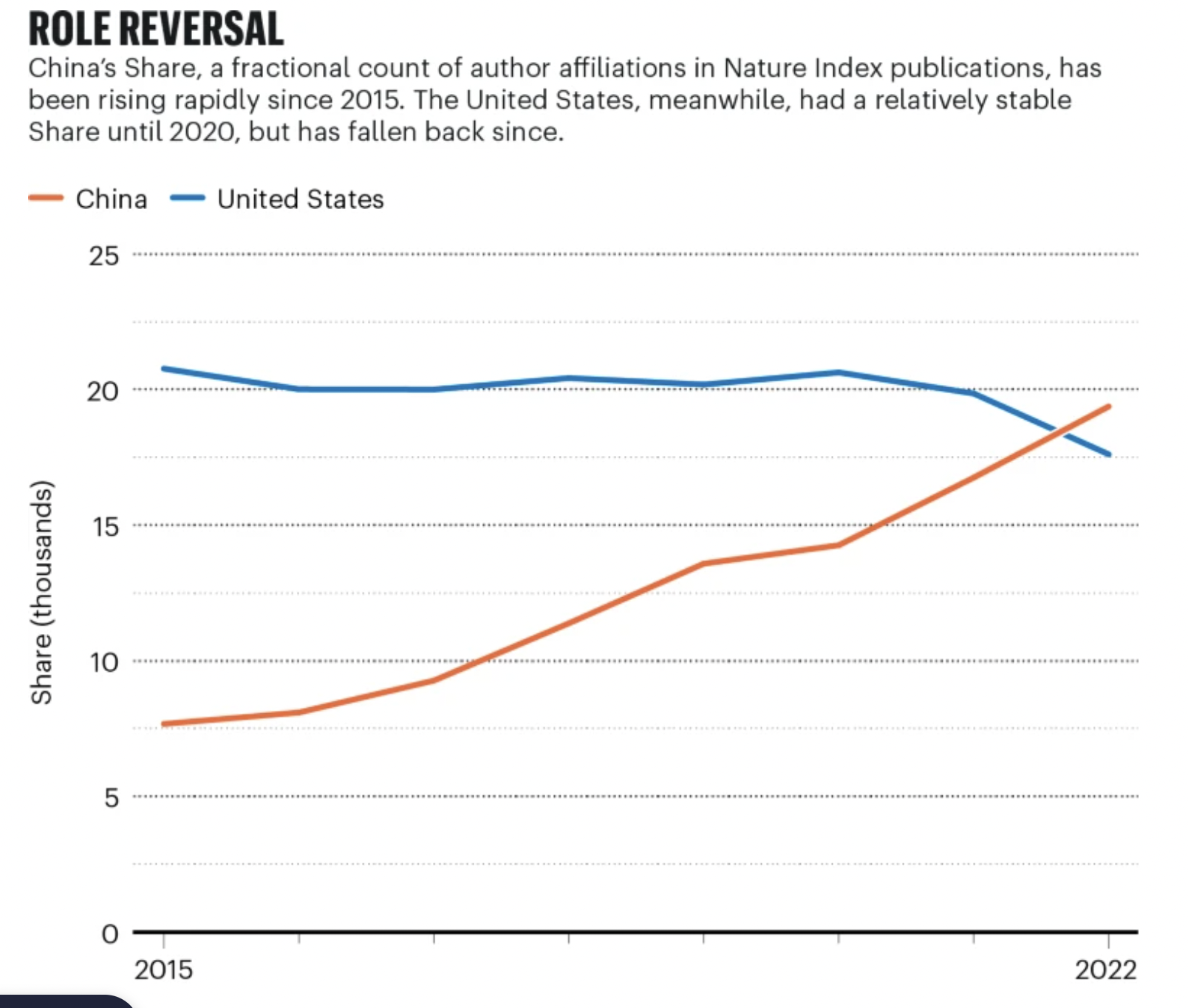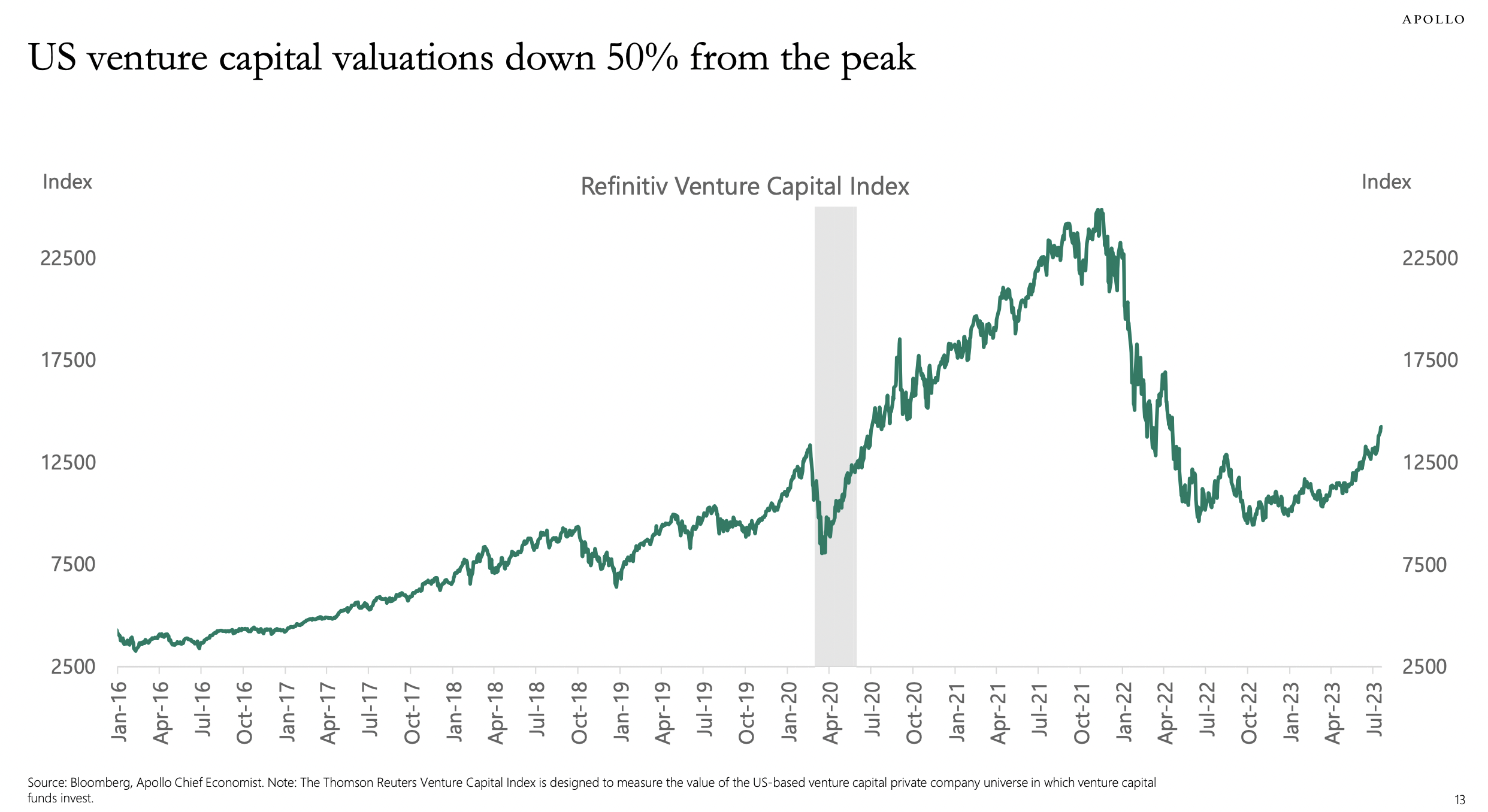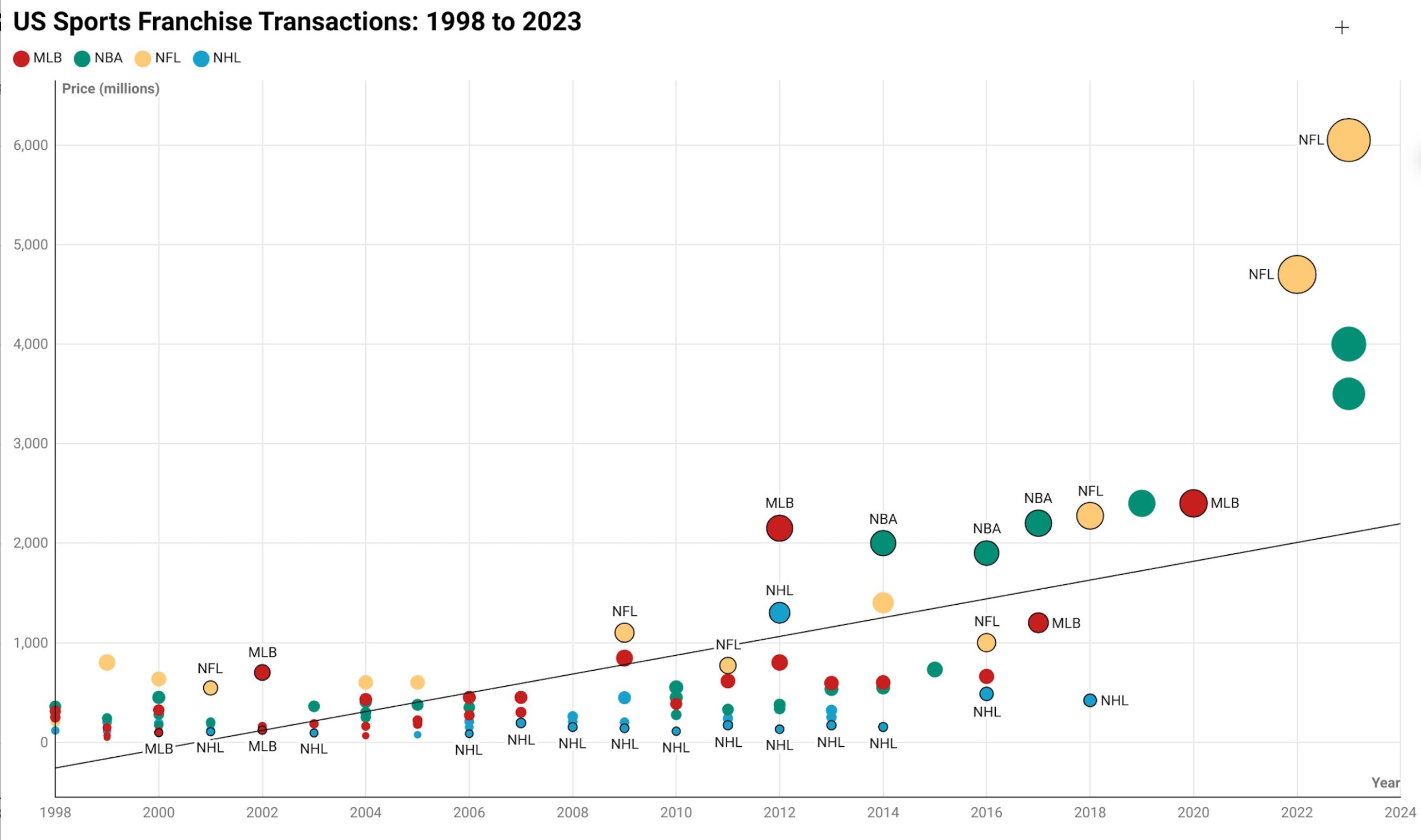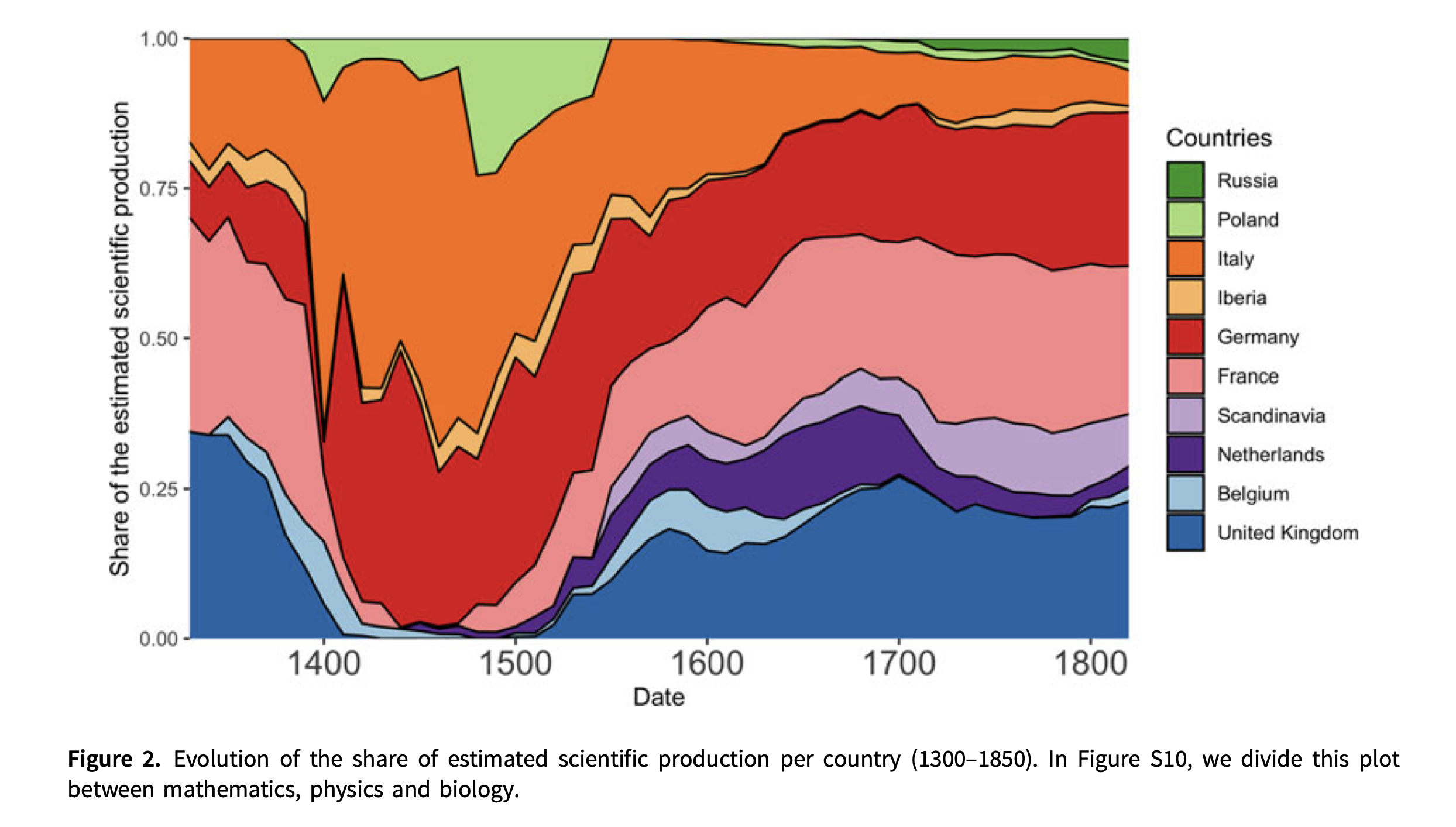- Interview between Goldman Chair/CEO David Solomon and former CEO/Chair of Google on the future of Generative AI is worth a read.
- “In general, the disruption occurs first in the industries that have the most amount of money and the least amount of regulation.”
- Pairs nicely with this analysis of the latest batch of Y-combinator companies that are using AI/ML startups (139 in total!) and what areas they are working on.
Misc
Miscellaneous is often where the gems are.
Sponge City
- Fascinating article on how Copenhagen, as a reaction to a major flood in 2011, has “re-engineered” itself to protect against any future flood risks.
China Research
- “For the first time, China has overtaken the United States as the number one ranked country or territory for contributions to research articles published in the Nature Index group of high-quality natural-science journals.”
- Source.
Less Well-Known but Useful Websites
Edward Luttwak
- Interview with the military and grand strategy author – Edward Luttwak – thought-provoking throughout.
- America’s power abroad, especially in Asia but increasingly with a resurgent Nato, is strong due to its alliances.
- But this power is useless unless you have cohesion at home. There America is experiencing a cultural war.
- Parallels with the Roman Empire are clear – “I think we could last another couple hundred years, but not much longer. For Rome, they had barbarian migrations and, of course, an ideological break that was fatal. Rome’s institutions were remarkable, and their concept of citizenship was something deep and profound, but the Romans were overwhelmed demographically.”
Financial Inclusion
- It’s no secret that emerging markets have been blazing the trail in terms of financial inclusion in the digital age.
- Incredibly, thanks to digital payments, India hit its 80% financial inclusion goal in six years, 41 years ahead of plan!
Attractiveness and Fund Manager Performance
- “In this paper, we study the relationship between stock fund managers’ facial attractiveness and fund outcomes. Utilizing the state-of-art deep learning technique to quantify facial attractiveness, we find that funds with facial unattractive managers outperform funds with attractive managers by over 2% per annum. We next show that good-looking managers attract significant higher fund flow especially if the funds are available on Fintech platforms where their photos are accessible to investors. Good-looking managers also have greater chance of promotion and tend to move to small firms. The potential explanations for their underperformance include inadequate ability, insufficient effort, overconfidence and inefficient site visits.”
15 Lessons
- Always ask what is the trade – working out how to profit from absurdity often uncovers its true nature.
- It is always the unintended bets that blow you up.
- This and a dozen other lessons from a quant research shop are worth a read.
History of Powerpoint
- Fascinating history of how we all ended up doing PowerPoint slides all the time.
- The creator of PowerPoint also has a colourful story – “It’s hard now to imagine deafening applause for a PowerPoint—almost as hard as it is to imagine anyone but Bob Gaskins standing at this particular lectern, ushering in the PowerPoint age. Presentations are in his blood. His father ran an A/V company, and family vacations usually included a trip to the Eastman Kodak factory. During his graduate studies at Berkeley, he tinkered with machine translation and coded computer-generated haiku. He ran away to Silicon Valley to find his fortune before he could finalize his triple PhDs in English, linguistics, and computer science, but he brought with him a deep appreciation for the humanities, staffing his team with like-minded polyglots, including a disproportionately large number of women in technical roles. Because Gaskins ensured that his offices—the only Microsoft division, at the time, in Silicon Valley—housed a museum-worthy art collection, PowerPoint’s architects spent their days among works by Frank Stella, Richard Diebenkorn, and Robert Motherwell.”
Alcohol and Ozempic/Wegovy
- More and more anecdotal evidence suggests that GLP-1 agonists (like semaglutide, the active ingredient in popular weight loss drugs Wegovy and Ozempic (off label)) could dampen cravings for alcohol.
- A survey of individuals taking these drugs by Morgan Stanley has confirmed this phenomenon.
- Up to six clinical trials are testing semaglutide in alcohol use disorder – which could provide conclusive proof.
- Investors are generally trying to determine the implications of the weight-loss revolution. As this chart shows the number of expert calls done by investors on AlphaSense on the topic has risen rapidly.
- Alpha Sense also has a handy guide to the Obesity space here (need to sign up).
Chief AI Scientist at Meta Talk
- Yann Lecun is the Turing Award winning professor at NYU and Chief Scientist for AI at Meta.
- His latest talk at MIT is worth a listen.
- It is a bit technical but left me with a feeling that though LLMs are a big breakthrough, they have big limitations.
- Models beyond the autoregressive LLM that start to mimic some of the planning and reasoning required to rival human intelligence are a lot more complicated with not-so-neat solutions.
US Venture Capital Index
US Sports Franchise Transaction Values
- Transaction value of sports teams in the US.
- “As you can see, transaction prices for sports franchises have been marching upwards for the last two decades, with NBA and NFL teams registering the biggest increases, but have seen breakaway surges in the last few years.”
- Source.
Wind Turbnine Innovation
- Turbines without giant blades are the next stage of evolution.
- This could bring wind power generation closer to homes.
- Really fascinating developments.
Who is the world’s largest landowner?
- Try to guess who is number one – they own 1/6 of the world’s surface.
- Fascinating who else tops the list.
- Answers here.
Political Bias in LLM Models
- Something to be aware of.
- “OpenAI’s ChatGPT and GPT-4 were identified as most left-wing libertarian.”
- “Meta’s LLaMA was found to be the most right-wing authoritarian.“
- Source.
Biology as Engineering
- What if drug development could one day be like engineering?
- Artificial intelligence has the potential to make this a reality, as is so well explored in this accessible Forbes profile.
- One of the most exciting parts they highlight is de novo protein design i.e. building proteins from nothing (this is a nice post about it from Derek Lowe).
AML/KYC
- Anti-money laundering (AML) and know your customer (KYC) are gospel in finance – but should they even exist? Does it actually work?
- Bruce Fenton and Tyler Cowen think no, with some compelling arguments and data.
Scientific Revolutions
- Fascinating chart showing how scientific revolutions progressed 1300-1850 between different countries.
- “Here, we leverage large datasets of individual biographies (N = 22,943) and present the first estimates of scientific production during the late medieval and early modern period (1300–1850). Our data reveal striking differences across countries, with England and the United Provinces being much more creative than other countries, suggesting that economic development has been key in generating the Scientific Revolution.“
- Source: Cambridge University.
The Laws of Trading
- “A book about trading isn’t ever actually about trading. It is either:
- “A former trader sharing stories from their glory days, e.g. Liar’s Poker, the exposé that morphed into a how-to guide, or“
- “Tales of Icarus flying too close to the sun, where readers revel in schadenfreude, e.g., When Genius Failed.“
- So starts this engaging review of “The Laws of Trading” – a different take on the endeavour with broader lessons for decision-making in other domains.
- The book’s author, Lebron, trained and worked as an engineer before switching to a career as a researcher and quant trader at Jane Street.






